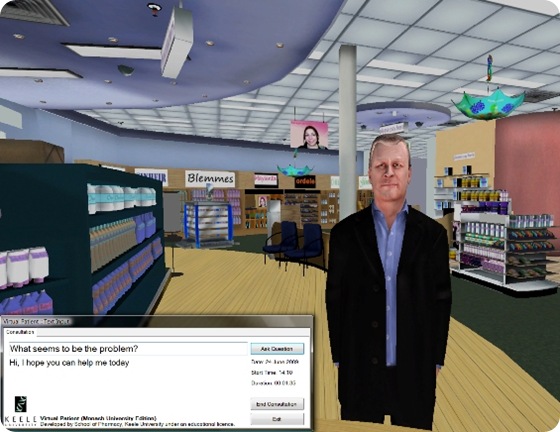Jun 24 2009
Keele University has developed a new programme to be used with its innovative Virtual Patient system to help pharmacists train in dispensing medication and providing advice on the treatment of hay fever and allergies.
With the summer fast approaching and pollen counts set to rise, the number of people seeking help for allergies will be on the increase. The unique Virtual Patient system, which is used by students on the University's pharmacy degree courses and can also be used by pharmacists in the community and clinical settings, allows people to interact with computer generated patients to develop their communication and prescribing skills.
The new programme has been developed to explore the treatment of patients with allergic rhinitis and the system can also be used to practice treating other conditions including dyspepsia and hypertension.
Learners talk to the Virtual Patient, which appears in a 3D computer generated environment - either a doctor's or hospital surgery, or a pharmacy - through voice recognition technology or by typing questions into a standard computer interface. The patient responds verbally or with a range of non verbal gestures to indicate emotions such as pain, stress or anxiety. At the end of the session the patient gives feedback to the trainees on their performance.
Trainees can also explore the virtual environment in which the patient is based, looking around the 3D hospital room or pharmacy, where the system allows them to find clues and information that will assist them in diagnosing and helping the patient. In a pharmacy setting for example, the new allergic rhinitis programme allows the trainee to go behind the pharmacy counter to find information about side effects for allergy treatments that may help in their consultation with the virtual character. 
Professor Stephen Chapman, head of Keele University's School of Pharmacy, said: "The Virtual Patient is a unique system that allows students and pharmacists to develop and hone their communication and prescribing skills in a way that allows them to get real time feedback from a patient and learn from their mistakes. Our latest addition on allergic rhinitis will prove extremely useful to community pharmacists facing an influx of people suffering from allergies over the summer months."
The feedback that the Virtual Patient provides can be aligned with formal learning objectives or national healthcare standards, to train learners for a range of real-world clinical scenarios and the Virtual Patient programme can be used on any standard computer to provide a patient on demand, so learners can use the system in a way that suits them.
The team at Keele University that developed the virtual patient are currently working on a £50,000 project to develop four Virtual Patients for Monash University in Melbourne, Australia. The university will use the characters on their new undergraduate pharmacy programme.
The team has also developed a virtual doctor to help in training pharmaceutical sales representatives. This system can be used in a classroom setting or for distance learning via the internet.